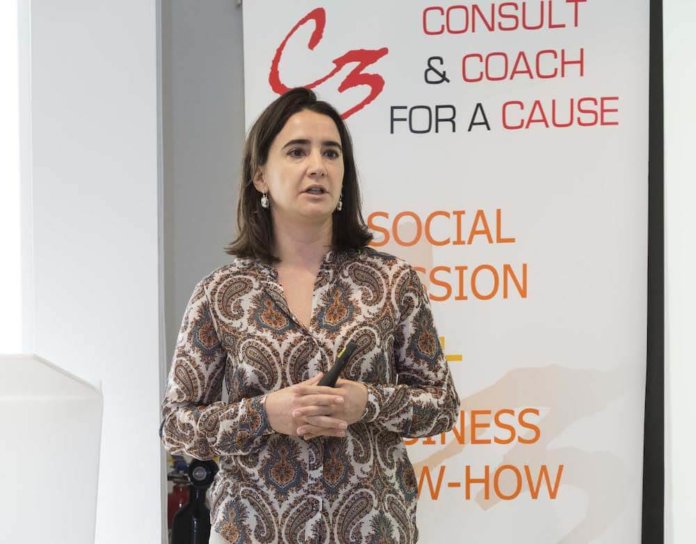
The journey of a social entrepreneur can be a lonely one, as they juggle the challenges of running a growing enterprise while staying true to their vision of a better world. But now that journey can be made easier thanks to C3, a UAE-based social enterprise that mobilizes corporate professionals to support emerging social entrepreneurs on a volunteer basis.
The Social Entrepreneurs and their strategies
In this interview with Tharawat, C3 Co-Founder and CEO Madea Nocentini gives an insight into the inspiring world of social entrepreneurs and how her organization is helping to foster their growth.
Tell us about what motivated you to found an organization like C3.
When doing a MBA in New York, in 2005, I had the opportunity to take social entrepreneurship classes and since then I was very intrigued by the concept of doing business while doing good. This thought accompanied me throughout my corporate career in the U.S. and the UAE, and in the summer of 2011, I started helping pro bono social enterprises using my skills in strategy and business development.
Word quickly spread of what I was doing among colleagues and friends in the corporate world, and I soon hosted the first speed-consulting event with a group of business professionals and ten social enterprises. The event was a great success and everyone showed interest in repeating the experience – Consult and Coach for a Cause (C3) was born.
How does C3 work?
Consult and Coach for a Cause (C3) enables emerging social entrepreneurs in the Middle East to become active agents of positive social change by leveraging experienced professionals who are seeking meaningful ways to give back. We identify entrepreneurs’ needs and match them with experts that, on a volunteer basis, help their business thrive while maximizing their impact on the community.
After registering with C3, members get access to Starter Program workshops that introduce aspiring social entrepreneurs and potential volunteers to the concept of social enterprise as well as the C3 philosophy.
The next step is to join the C3 Accelerator Program, through which our experts help entrepreneurs on a one-on-one basis develop skills necessary to deliver their social business goals.
Recently, we have introduced webinars to deliver content previously only available in workshops. This allows us to reach entrepreneurs in other parts of the region such as Palestine, Oman, Morocco and Egypt and unlock their potential – entrepreneurs who might not otherwise be able to attend our events. It is very exciting to see C3’s impact crossing borders!

Why is it important that social businesses have this community of support provided by C3?
Starting a business is never easy, and for social entrepreneurs, it is even harder because they have to balance business performance with a social mission. Having a community that thinks alike and that has experts willing to help is a great help to them.
Moreover, many entrepreneurs cannot afford business coaching in areas like professional financial and legal advice. With C3, it is possible to access such expertise for a token matching fee. For the mentors and coaches, being part of C3 allows them to put their skills to good use while learning critical leadership and management skills.
What do you think about the current state of social businesses in the Middle East?
As far as we know, there is no regional data on existing social enterprises. Nonetheless, one of the things we can assess is the growth rate of this type of business. 5 years ago we could count tens of social entrepreneurs, but today we can count hundreds of them.
The community impact of regional social enterprises is amazing due to the breadth of their missions, ranging from water saving to health improvement, children’s education to refugee support.
We are also trying to encourage social enterprises to measure their social impact. C3 was the first international organization outside the UK to be certified by Social Enterprise Mark CIC, the only global, independent certification authority for social enterprises. Since then, C3 has supported one of our entrepreneurs (a social fashion startup called Palestyle) obtain the first Social Return on Investment certification in the region, and now we are seeing entrepreneurs increasingly take up our social impact measurement one-on-one module.
What are the top opportunities and challenges for social entrepreneurs?
Opportunities for social enterprises are immense because the social enterprise is an effective way to positively impact a community in a systemic and sustainable manner. This is particularly true in the Middle East, where basic social and environmental issues have not yet been solved.
Social enterprise business models also make a lot of business sense. A recent Social Enterprise U.K. study suggests that, 38% of U.K. social enterprises saw an increase in their 2013 turnover compared to only 29% of SME’s surveyed by the Department for Business. Social missions help organizations stay focused on their core business and become innovative at problem solving: the same study suggests that more than half of social enterprises (56%) developed a new product or services, compared with 43% of SMEs.
By contrast, they still face a number of challenges that are similar to those that commercial entrepreneurs face, such as securing funds and attracting talent.
In addition, social entrepreneurs need to constantly align their social mission with their business planning, measure their social impact, and ensure their operations are consistent with their social values. This means that a product line or entire business model will sometimes need to be rethought if the intended impact is not as great as expected or creates negative impact. In the social enterprise world, there are no rewards without a lot of holistic thinking and doing.

What do you think needs to happen to encourage social entrepreneurial activity and investment, especially in the Middle East?
We need critical enablers who foster the environment for social enterprises to thrive, such as:
- A regulatory framework that allows social enterprises to set up appropriate and flexible forms of businesses including social enterprise governance and best practice.
- Visionary investors willing to invest patiently and flexibly, perhaps even via coordinated and collaborative types of capital (grants, loans, bonds, equity), to ensure local solutions to local issues.
- A higher education system that can support the next generation of social entrepreneurs with expertise and relevant courses.
- Existing initiatives working cohesively to build a social enterprise sector instead of competing with each other and trying to reinvent the wheel.
- Access to mentoring and tailored business training, as well as affordable consulting and coaching support. This is the area where C3 has been focusing and thriving in the past few years.
All of this will take some time, as governments around the region have not yet legislated in this sector. Investors are also focused on short-term returns and prioritizing investments of existing successful international ventures and regional universities still push business and entrepreneurship initiatives to maximize shareholder rather than stakeholder returns.
What is C3’s ultimate vision and what are its plans to continue fostering social entrepreneurs?
We are the first regional accelerator focusing solely on the growth of social enterprises, and through the quality of our services and breadth of our network, we want to become the first stop for all social entrepreneurs in the MENA region.
We want to mobilize as many professionals as possible to help the social entrepreneurs who can benefit from their skills and experience to solve pressing regional issues. We already have a community of more than 1,000 like-minded professionals and we are engaging with corporations that want to contribute to this vision. C3 is also introducing programs for advanced entrepreneurs who need help establishing proper corporate governance and quantitatively measuring their social impact.
What’s the top 5 advice that C3 gives to its social entrepreneurs?
1. Make sure the social issue you want to solve has personal resonance and distinction, while being clear on whom you are trying to help.
2. Ensure that the quality of your product or service is top notch. The better the quality, the more the sales, which results in more opportunities to accomplish your social mission. The secret is to align the social cause with financial performance.
3. Ask a lawyer – registering your business, writing contracts, and drafting shareholder agreements can be time-consuming become prone to expensive mistakes.
4. Don’t do it all on your own. Get support from experts in areas you are not strong in, solicit input from your team members, cultivate relationships within your community, and ask for help.
5. Don’t be afraid of challenge or failure. Many successful entrepreneurs have launched failed products, learnt from their mistakes, changed their value proposition, and launched them again to find the right formula. To succeed, make sure you fail fast and often.









